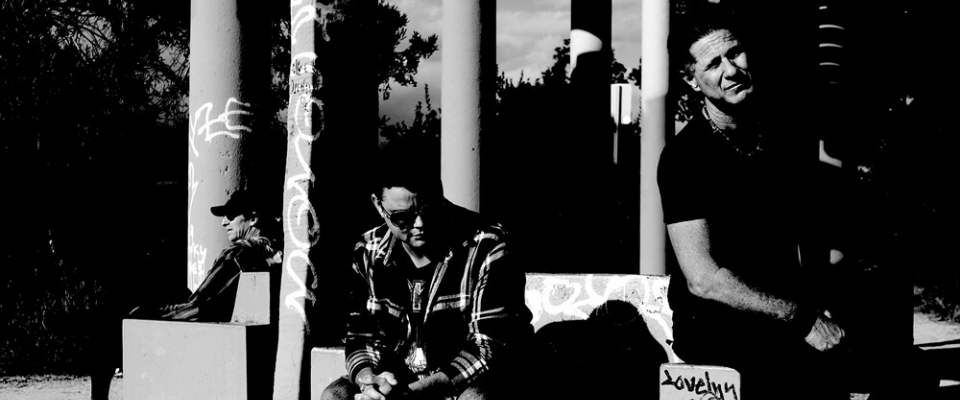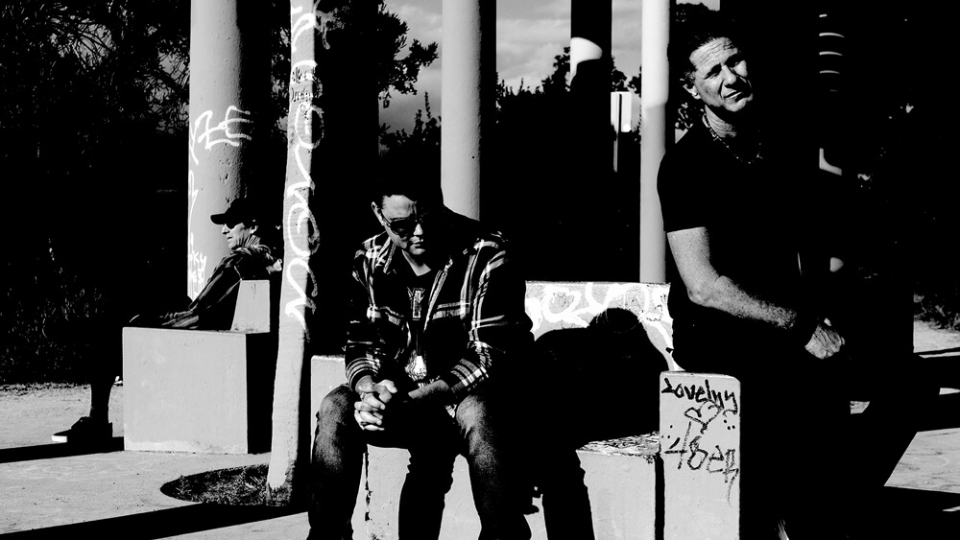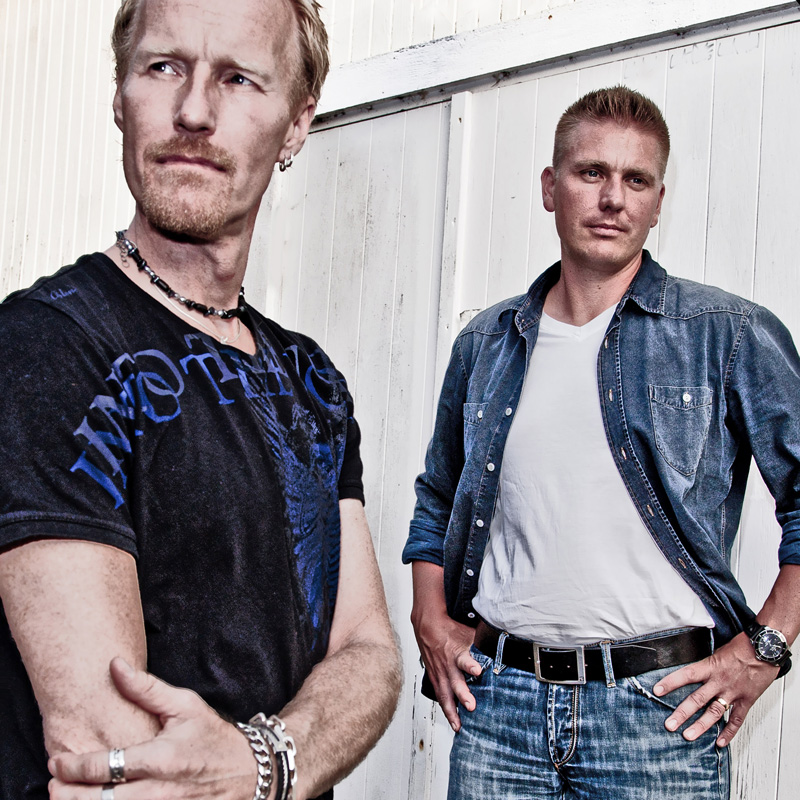
by Alexandra Mrozowska
— Senior Columnist —
In this nostalgia-driven era of constant flashbacks from our much romanticized past, there’s nothing more refreshing than seeing an experienced artist still looking forward. Take a look at Neal Grusky. You may remember him as a leader of the Melodic Rock ensemble Takara back in the ‘90s, but now he’s moving on with a new band – and a new sound. Obviously, we couldn’t help but ask a handful of questions about Takara as we caught up with Neal recently. The main focus of our conversation, though, was on a new musical chapter he’s just starting – called Prey For Sunday…

Hardrock Haven: For you as a guitarist with years of experience, are there any new guitar players out there that you find interesting or even inspiring?
Neal Grusky: As far as new guitarists go, there are a few I admire – for example, Jinx from Black Veil Brides and Synyster Gates of Avenged Sevenfold. I follow the modern Rock scene pretty closely and the bands of the scene that I really enjoy are Shinedown, Asking Alexandria, Three Days Grace, Halestorm… I really love a lot more bands than these, just mentioning these! The music from the modern Hard Rock scene really excites me. I feel the songwriting is amazing, as well as the production. I don’t even listen to anything from the ‘80s anymore. Modern music is all I listen to currently.
Hardrock Haven: So how are your influences different from what had an impact on you in your early days?
Neal Grusky: I believe our current influences as compared with the influences from our early influences would be different in terms of the quality and talent of the songwriters. I think many of our current influences are much better songwriters than those of their early counterparts. The evolution of songwriting has come a long way from where it was in the past. We applaud everyone that embraces the evolution of songwriting and we pride ourselves in the art of songwriting.
Hardrock Haven: That explains a lot in terms of where the heavier and more modern direction of your current band Prey For Sunday comes from.
Neal Grusky: What inspires us is the need to diversify what we create musically. We ourselves enjoy heavier music as well as other styles. We see music as a way to communicate and we use it as a way to make heavier musical statements.
Hardrock Haven: In which circumstances was Prey For Sunday founded and is it more of a project or a band?
Neal Grusky: I founded Prey For Sunday in 2017. I began writing and recording with the producer Peter Strzelecki. I had written and recorded ten songs with Peter by the time I met singer Tony Persico. And well, Prey for Sunday is a band. Tony and I will continue to develop the band and the songs. We intend on touring as well as continuing to release new music. We are very prolific as songwriters, therefore there will never be a shortage of good music.
Hardrock Haven: Having recently released a debut EP, are you satisfied with this release and do you plan to follow it with a full-length album soon?
Neal Grusky: We are satisfied with the release thus far. We have a video on YouTube for our first single “Don’t Let It End” and I have to say we had a lot of interest in that song and video. Soon we are releasing our second single/video for the song “Broken Hearted Man” and, later on, “Mary Go Round”. As for the former, we hope it will really have a great impact on our career trajectory and we are excited for people to hear this song. We also plan to tour and promote the EP much more – we are still in the middle of this EP cycle – and we hope to coincide our touring with a new release. It seems that the world is beginning to return to where we were over a year ago. We have more music we plan to record and release very soon as well, including a full length release – however, we do plan to release a few more singles in the meantime…
Hardrock Haven: Speaking about the EP, what was the process of making the recordings like and what impact did the producer – Peter Strzelecki – have on it?
Neal Grusky: The process of recording this time for me was very creative – perhaps more so than ever in the past. We had the luxury of time to consider all the options for each song. It was what gave me the option to try different ideas, and make sure that they would complement the song. Peter would point out ideas we had or complement an idea of ours, with a suggestion of what could work with it. He had a lot of great sound ideas as well as arrangement ideas that were really helpful. All and all, his production of our music was really good.
Hardrock Haven: Are you busy with anything else beyond Prey For Sunday right now?
Neal Grusky: I’ve been asked to do a few side projects, but as of now, I haven’t been able to [take part in any] since Prey For Sunday is taking most of my time. There’s a chance in the near future I’ll be taking part in a project with a friend of mine. I can’t say much more about it than that.
Hardrock Haven: We look forward to any news then! Still, many of our readers know you as the founding member and lead guitarist for the Hard Rock band Takara. What’s the current status of the band, especially in the light of your recent activity with Prey For Sunday?
Neal Grusky: The current state of Takara is on hold. I have no plans to do anything currently. However, I am planning to release a demo that Jeff [Scott Soto] and I did in 1988. It has four songs on it, all from the first Takara album. The quality of this recording is amazing. I also plan later this year to begin to re-release Takara albums. If the time is right, I would consider recording another Takara album again; still, I’m so busy now with Prey For Sunday that I just don’t have the time now.
Hardrock Haven: As you’ve mentioned the demo recorded with Jeff Scott Soto on vocals back when Takara started, why did it take you so long to decide you’re gonna release it for the wider audience?
Neal Grusky: It’s taken a while because I hadn’t really given it any serious consideration ‘till a few people kept pressing me about it. Once I listened to it, I knew it was special, and had to be released.
Hardrock Haven: It took quite long to release the first Takara album back in the day too – from the demo you’ve mentioned up to 1990 when you reportedly started to work on the album until 1994, when Eternal Faith was eventually released. What was it caused by?
Neal Grusky: It took so long because I wasn’t able to get any label interest here in the US and also, all the songs were not completed ‘till 1992 as the first demo was four songs only… Over time I would add a few songs here and there, ‘till I had a total of ten songs. I had problems to get the deals in place, I didn’t have management or a label. So to answer your question, it took a while, but it was worth the wait for me. It gave me the chance to release in the way I wanted to as well.
Hardrock Haven: As Jeff Scott Soto was involved in first classic Takara albums not only as a lead singer, but also as a producer, do you – as a leader of the band – think these albums would have been much different in terms of sound and songwriting without him on board?
Neal Grusky: Yes, vastly different. Jeff and I were 50/50 partners on these albums. I thought we clicked incredibly well. I myself couldn’t imagine those albums without him and we worked on them hard together. I’ve been told by many people that they consider these albums as some of their favorites of all time, so I know we made an impact on people’s perception of the work we put into them.
Hardrock Haven: Takara was unique in many respects, one of them being of course the style – Melodic Rock/AOR direction pursued in the mid-‘90s. Have you experienced any difficulties with getting your music across to the audience in what was largely the Grunge/Alternative era?
Neal Grusky: It was not the best time to release our music. But I felt if we could do it then, then we were doing something right. It was not the best time, but there were a lot of people who purchased the albums then and were very happy. It was more a matter of finding our audience then, and then anything else.
Hardrock Haven: Twenty five years forward, Melodic Rock seems to have its revival – albeit on a smaller scale than it was in the ‘80s. Why do you think this style of music still resonates with people, both those who remember the ‘80s and those who weren’t even born back then?
Neal Grusky: I see the revival that you are referring to now. I feel that there are people out there that really miss this music, and still support it. I also see many of the newer bands that have a very similar sound to what we had, and that inspires more people to seek out bands from the ‘80s etc. to listen to, so I’d say half of the people are younger, and half are older. I feel strongly that bringing the younger fans together with older fans only will make the music scene a lot stronger than it ever was.
Hardrock Haven: Another staple in the history of Takara was that many members came and went, and also the labels changed from one album to another. Was it easy to navigate through those changes and pursue what you wanted Takara to be?
Neal Grusky: It was the most difficult part of it for me. I always wanted a band to be locked in and working together. I felt it would build the band chemistry – changing members and labels never really gave the band a chance to experience success I felt it could achieve. Nonetheless, I tried my best the whole time to deliver the best product I could and most the changes were out of my control.
Hardrock Haven: Is there anything you’d like to add in the end? Neal Grusky: We would like to thank everyone for their support over the years. We sincerely hope everyone will continue to follow us as they did with Takara. Also, we are on social media – on Facebok, Instagram, Twitter – as well as all fine streaming sites. Feel free to reach out to me on social media as well. I look forward to meet all of you when we go out on tour.



